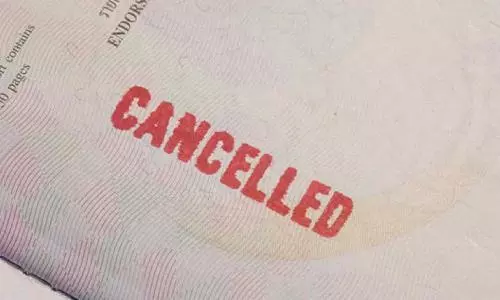
The imperative of traffic culture
text_fieldsThe recently amended law increasing traffic law volations has turned out to be a headache for the central government. As a result of countrywide protests against disproportionately hefty fines, Modi government has been forced to soft-pedal its fining thrust at least for the time being. Central miniser Nitin Gadkari clarified the other day that the matter would be brought under the Concurrent list of the Constitution, according to which fines for traffic violations could be decided by the respective states.
Interestingly enough, half a dozen state governemnts led by the BJP itself, have allied themselves with the protestisng ones. Other states were not different. BJP governments like Gujarat and Uttarakhand have declared waivers by this time. This law is in fact one of those legislations pushed through in parliament in a hurry using brute majority. Those enactments, all passed without substantive debates or study, were enforced by the Centre leaving no space for challenging. It is in that context that the amendment imposing hefty fines for traffic violations came to be questioned in the streets which forced the government to declare concessions at least partially. In that sense, all that has happened in this connection should be a big lesson for Modi government: the main lesson here being that if the effort is to thrust forward counting on the numerical strength in parliament alone, that will - albeit at times - create dissent from within.
Even a cursory glance at the amendment would show that the hikes introduced are exorbitantly high. The fine for driving two-wheelers without helmet and other vehicles without seat belt has been raised from Rs100 to Rs 1,000. Those without licence have to pay Rs 5,000 now instead of Rs 500 earlier. According the new law a driver caught with a licence even after a day of its expiry, has to shell out Rs 10,000 as fine. This is complicating the matter technically and otherwise. The question what the authorities will do if all such people booked refuse to pay fine and move the court , cannot be easily dismissed. Probably because it became aware of this at least to some extent, the Centre has started mulling some concessions in the matter of violations like expired licences. So far so good.
Gadkari dismisses the charge that the driver for imposing so huge fines is financial. He said that there is no such agenda and the main target is to reduce the increasing number of road accidents. This argument merits elaborate discussions. In our state of Kerala alone, as per a recent statement by transport minister AK Shasheendran in the assembly, 11 people die in motor accidents every day. Over the last three years, 12,392 people lost their lives on the roads of Kerala. That means that all the lives saved by our model in the health care sector, are being sacrificed at the altar of transport. The majority of accidents during this period were a result of traffic violations. The way to reduce accidents is to obey driving regulations. And those who are not prepared for it, should be penalised. So viewed, Gadkari's comment carries sense; therefore, the penal fines introduced now cannot be termed flawed.
But there is a flip side to the issue. Indications of this are seen in the statement of Goa government in its refusal to enforce hefty fines, i.e. the pathetic condition of the roads. What is being questioned is the morality of imposing fines without repairing roads. The Supreme court had appointed a commission headed by former Judge KS Radhakrishnan in 2018, to study aspects of road safety and submit a report. The committee found that during five years from 2013 to 2017 alone, 14,296 people had died in potholes across the country. The apex court, while reviewing the report, had also commented that more people die by falling into pot holes than in terrorist attacks.
That means, we are caught between continuing traffic violations on the one hand and roads with pot holes on the other. There are other factors as well like the proliferation of vehicles on the roads. What is needed in fact is a package solution addressing all these factors. This is not going to end by hiking the fine alone. At best it can perhaps diminish the number of accidents. The ultimate solution lies in a model traffic culture with discipline. And that cannot be developed by mere legislation; instead it will require constant awareness creation and self-discipline.























